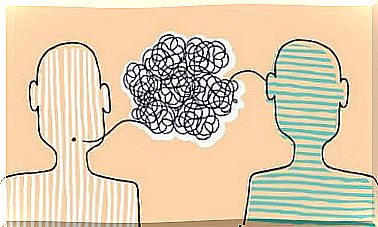Insecurity: A Silent Killer

Security is associated with the need we have to know what will happen next, so that we can expect what life will be like and control it. So that we are not taken to bed. Uncertainty is understood as a human driving force. Especially one that makes us confirm that what we think or what our senses tell us is true.
Although it varies depending on the degree and environment in which it occurs, uncertainty is unbearable for some people. This is where it assumes its motivating role because the person who “suffers” from it must act to reduce it. At least until it is lowered to a level that that person can handle.
Some people tolerate uncertainty better than others. People who are in a situation of great uncertainty dedicate many cognitive resources to solving this, and even more so if their tolerance is low. Two people may have had a job interview, and need the job in the same way. But if one of them has a low tolerance for uncertainty, he will probably want the result as soon as possible. He will not wait for the company to contact him. He can take matters into his own hands and call the company himself.
On the other hand, uncertainty can also arise when we meet a new person. We do not know what the other person is like and this can make us insecure. Our cognitive resources are limited. Cognitive shortcuts and heuristic strategies are therefore good tools for quickly reducing uncertainty. These ways of reducing uncertainty are effective, but they also have negative consequences. For example: stereotypes or prejudices that arise when we compare ourselves with other people or groups.

Trigger of uncertainty
Below you will find some of the reasons that create uncertainty. You may recognize some of them!
A source of uncertainty is the opposite of our expectations and the signs that reality gives us. Let’s assume that we just had that job interview we talked about above and that this went great, so we leave the place and think we’ve got the job. But the days go by and the company does not call us. This is a common sign that the job will not go to this person. So if we keep in mind the self-esteem with which we left the place and the contradictory signs, the feeling of insecurity will probably be even greater.
Another source of uncertainty comes from opposing behaviors and values. When we perform actions that are not in line with our values, our uncertainty will increase. We can use the example with a job interview again. If we necessarily go for an interview for a job that is not in line with our interests, this will also increase our uncertainty. This scenario is often seen in movies when a lawyer who usually defends the environment starts working for a company that destroys it. These behaviors can create states of anxiety and insecurity and even cognitive dissonance.
Social injustice is also emerging as an element that can produce certain levels of insecurity. The injustices we experience in our daily lives can cause insecurity. This includes when we see that others are suffering, if we can not handle it. The lack of control over these injustices makes us doubt our ability to predict the future. When we are confronted with this situation, a certain attraction arises for radical ideologies and also for groups that promise to end these injustices.
Uncertainty from the point of view of social psychology
Uncertainty, according to social psychology, can be understood in different ways. One of them explains it as the necessity for a cognitive conclusion. This need for a cognitive conclusion can be defined as the need for a quick answer to a question that has a confusing content.
When we feel the uncertainty, we try to look for information that we find to be truthful so that we can reduce it. We find it, the information reduces it and is considered an important knowledge for our daily lives.
The need for a cognitive conclusion seeks to crystallize and simplify self-knowledge. This search for information that creates knowledge shows differences between different people, depending on the information that each of them chooses.
If I, in order to reduce the uncertainty produced by waiting for the results of a job interview, accept the idea that I will not be elected and another person accepts the idea that the company only takes time to make the decision, we will have very different perceptions regarding the process. Our expectations, when the days go by without results, will differ more and more.

Uncertainty can modify our behavior
The knowledge we have formed regarding how a company works can also change. Even people with a need for termination may in certain circumstances (temporarily) have an open mind while looking for a cognitive termination.
If we later go to another company for an interview, we will probably tell the people that we want a quick response. If the same thing happens, and they linger too long with an answer, the uncertainty will come back, and we will once again try to reduce it.
In this case, the interpretation that we will not get the job does not work because they should have communicated the answer to us already. The need for an end will put us in an alarm state. And it will also make us look for other possible interpretations as soon as possible. For example, that the company has chosen us, and that we have passed the interview phase.
Once the cognitive conclusion has been reached, people with a high need for a conclusion will “preserve” their assessments so that they do not submit new information. The new idea of the company’s behavior is more resistant than the previous one. It will therefore not change until new information contradicts it. For example, the confirmation that we have actually been accepted.
What happens when our need for closure is great?
The need for a cognitive conclusion, when aroused, can lead to a wide range of phenomena. The function of this need for closure is to create a coherent shared reality with a group. If the knowledge our group gives us does not reduce our need, we will look for another group.
Those who need cognitive ending are also more concerned about reducing uncertainty quickly than reducing it properly. Those who have such a need form impressions much faster, with limited evidence. They usually base their assessments on common stereotypes. These people are also looking for fewer options when it comes to solving a problem. They are less empathetic with those who think differently. These people will also not adapt their language when they have to explain their thoughts to others.
Those who have such a need first overcome the uncertainty by accepting the first information they can get in order to draw a conclusion. They then accept this conclusion without questioning it. These people are looking for predictable contexts.
Social perceptions and norms shared by members of a group give them security about how the world works. Regarding what needs to be done in certain situations, about who they are and why they are important. Groups provide the context that these people are looking for. These standards also become their greatest source of security and knowledge.









